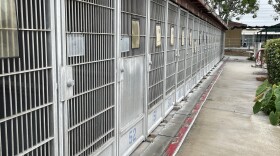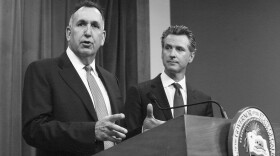President Obama's televised health care summit with congressional leaders of both parties is just days away, but given reaction to the release Monday of his own health care overhaul proposal, one could wonder: What's the point?
The president's $950 billion plan, after all, the first under his own imprimatur, looks like a tweaked version of the stalled no-public-option legislation proposed by Senate Democrats — the one that attracted zero votes from Senate Republicans.
And though the White House characterized the president's initiative as a starting point for his meeting Thursday with House and Senate leaders, majority Democrats have made it increasingly clear they are likely to pursue passage of a comprehensive health care bill through a procedural tactic that won't require any GOP votes.
Republicans were predictably apoplectic. House Minority Leader John Boehner, in his blander comments, accused the president of setting up the summit as his own "infomercial."
He had a point.
TV Opportunity
Indeed, the point of the summit for the Obama administration, and Democrats, is exceedingly apparent — and much of it has to do with the president's own party, television cameras and the viewing audience.
The president needs to bring fractious Democrats together in a public show of solidarity behind a comprehensive health care initiative that has managed to both disappoint liberals and frustrate centrists.
And he wants a public platform to sell the health care overhaul to the increasingly skeptical American public, while forcing Republicans beyond opposition talking points and into the realm of policy.
Mark Blumenthal, a political pollster and analyst, says Thursday's summit provides a "clear and overwhelming opportunity" to do just that — if people tune in.
It was a strategy that worked in Obama's favor last month when he accepted an invitation to speak and take questions at the House Republicans' retreat, and then asked that cameras be allowed to carry the event live.
Polls show that while Americans are overwhelmingly skeptical of health care legislation, they are unaware of many of its provisions — and supportive of many when asked about them separately.
"How this summit is received depends on how it's covered, who watches, and what the story is," says Blumenthal of pollster.com and a National Journal columnist. "To the extent that the Democrats can show unity, that would be a huge positive."
Circle The Wagons
Democrats are looking at the summit as a stepping-off point to shift what has become the default national narrative about the health care overhaul legislation: that Republicans hate it; that Democrats can't agree on it; that it costs a lot of money; and that it's not clear to people how they will benefit.
Since little has changed on the health care issue over the past month, except for the highly publicized plan by California's largest for-profit health insurer to raise premiums on individuals by up to 39 percent, Thursday's summit provides a unique opportunity to revive the president's signature domestic effort in the eyes of Americans.
It's difficult for the White House to maintain reconciliation as the end game, and not have the summit feel like a bit of extortion.
An improved public view of the Democrats' bill, strategists say, is important if the party, as expected, attempts to push the legislation through on a procedure known as reconciliation. The procedure allows legislation to pass through the Senate with a simple majority vote, instead of the 60 votes usually required to avoid a filibuster.
In his proposal, Obama has taken steps to bring his party together:
--He eliminated the controversial sweetheart deal Republicans had dubbed the "Cornhusker Kickback" that gave special federal funds to Nebraska to win the support of Sen. Ben Nelson, a centrist Democrat.
--He bowed to labor union pressure and delayed a plan to tax benefit-rich coverage plans.
--He proposed a federal authority to review "unreasonable rate increases and other unfair practices of insurance plans" between the time legislation is enacted and rules are written to implement changes.
--And he left out the public insurance options included in the House bill.
"I see this as a giant reset button," says Darrell West, head of governance studies at the liberal-leaning Brookings Institution. "This is a way for Democrats to say, 'We've heard the public anger, we've removed a few items and added a new feature.' "
GOP Pushback
On the Hill, Senate Minority Leader Mitch McConnell accused Democrats of "ignoring what Americans across the country have been saying," and said that Republicans will advocate step-by-step changes instead of a comprehensive bill.
"Sen. McConnell is not going to walk into that summit with a 2,700-page bill that raises taxes and slashes Medicare," says Don Stewart, McConnell's spokesman. "Americans have rejected that approach, and anyone who doesn't realize that simply isn't listening."
What has been most galling to Republicans, they say, is that the president scheduled the summit while it's clear that Democrats are on a march to force through some sort of health care overhaul.
Mike Gonzalez of the conservative Heritage Foundation says Republicans are understandably riled by the way the summit is playing out for them.
"It's difficult for the White House to maintain reconciliation as the end game, and not have the summit feel like a bit of extortion," he said. "It provides the president political cover: Have the Republicans show up, and if they don't agree, go through the reconciliation process."
Obama's Show
The point of the summit is to publicly and quite visibly put some folks on the record, and I think that the president and his folks have figured out that the more light, the better it is.
Though his job approval numbers on health care have dipped to below 40 percent, the president will get his shot at reframing the discussion Thursday.
It will signal the start of what Democratic political consultant Tom Ochs calls the "scramble to get something passed, and passed as quickly as possible."
Whether that something includes anything on which Republicans and the president can agree Thursday, appears increasingly immaterial.
The summit, Ochs says, presents a difficult scenario for Republicans — not showing up "would have been bad for them.
"The point of the summit is to publicly and quite visibly put some folks on the record," Ochs says, "and I think that the president and his folks have figured out that the more light, the better it is."
But that light will also be shining on Democrats, including House Speaker Nancy Pelosi and Senate Majority Leader Harry Reid, who don't always see eye to eye. And Democratic leaders face the difficult task of having to placate party moderates who want, for example, more stringent restrictions on the use of federal money for abortions, and liberals still pushing for a public insurance option.
The president, no doubt, is hoping that a summit that now seems like it has the makings of a publicity coup will still feel that way come Friday morning.
Copyright 2022 NPR. To see more, visit https://www.npr.org. 9(MDAzMjM2NDYzMDEyMzc1Njk5NjAxNzY3OQ001))







